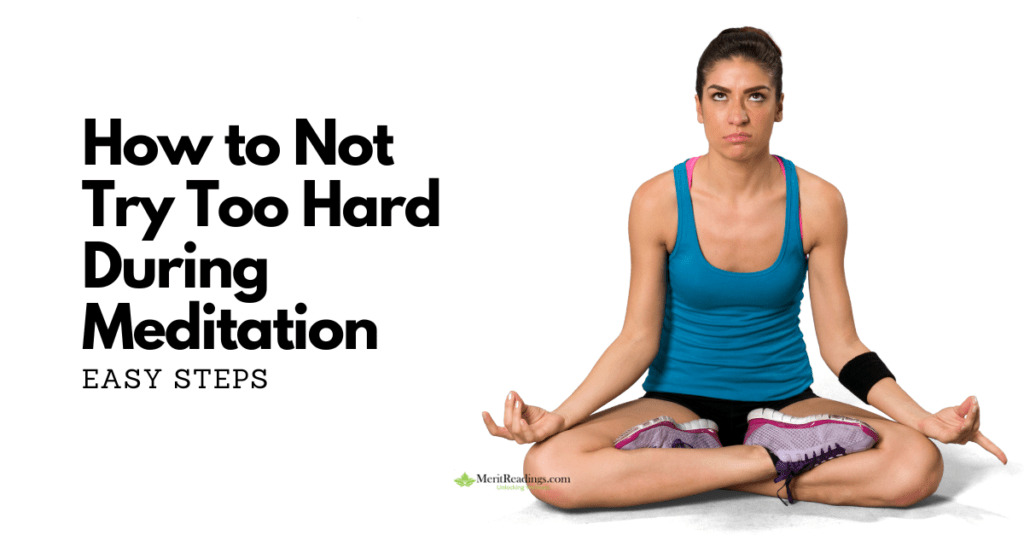Meditation is meant to help you relax and clear your mind. But sometimes, we try too hard to make it “perfect,” which ends up making things more challenging. I know this because I’ve been there myself. I used to overthink my meditation practice, trying to do everything right. It only made me feel more stressed! But I noticed a big change when I let go of the need to control everything. Here are some simple tips that helped me — and I hope they help you, too.
- 1. Let Your Thoughts Come and Go
- 2. Let Go of Perfection
- 3. Focus on the Process, Not the Result
- 4. Be Kind to Yourself
- 5. Let Your Breath Flow Naturally
- 6. Allow Yourself to Relax
- 7. Use Guided Meditations
- 8. Accept All Meditation Days
- 9. Start with Short Sessions
- Meditation Types: What Not to Do
- Conclusion
1. Let Your Thoughts Come and Go
Why It Matters
Instead of trying to block your thoughts, just notice them and let them pass. If your mind wanders, softly shift your attention back to what you’re focusing on — whether it’s your breath, a sound, or a sensation around you.
What You Can Do
Instead of trying to block your thoughts, just notice them and let them pass. If your mind wanders, gently bring your focus back to your breath or the sounds around you.
Quick Tip
Think of your thoughts like passing traffic. You don’t need to chase after them — just watch them come and go without getting involved.
2. Let Go of Perfection
Why It Matters
Many people think they need to have a “perfect” meditation session where their mind is totally calm. However, aiming for perfection creates pressure and makes meditation feel stressful.
What You Can Do
Remind yourself that meditation doesn’t have to be perfect. Some days will feel peaceful, and other days, your mind will be busy — both are okay. The goal is to be present in the moment, not to achieve a perfect state.
Quick Tip
There’s no right or wrong way to meditate. The key is to accept whatever happens during your practice.
3. Focus on the Process, Not the Result
Why It Matters
It’s easy to focus on wanting a specific outcome, like feeling calm or peaceful. But when you chase a result, you can get frustrated if it doesn’t happen right away.
What You Can Do
Pay attention to the experience itself. Notice your breath, how your body feels, or the sounds around you. Let go of any expectations about what you should feel.
Quick Tip
Think of meditation as a journey, not a destination. The experience itself is valuable, no matter what feelings come up.
4. Be Kind to Yourself
Why It Matters
It’s common to feel frustrated if you think you’re not meditating the “right” way. But self-criticism makes it harder to relax. Meditation is about creating a kind, non-judgmental space for yourself.
What You Can Do
If you feel frustrated, acknowledge it and let it go. Treat yourself with the same kindness you would offer a friend who’s learning something new.
Quick Tip
When you feel frustrated, say to yourself, “It’s okay. I’m doing my best.”
5. Let Your Breath Flow Naturally
Why It Matters
Some people try to control their breathing to feel more relaxed. But forcing your breath can create tension. Your breath is natural — it doesn’t need to be controlled.
What You Can Do
Let your breath come and go on its own. You don’t need to make it deeper or slower. Just observe your breathing as it is.
Quick Tip
Think of your breath like ocean waves. It rises and falls naturally. You don’t need to force it.
6. Allow Yourself to Relax
Why It Matters
We often feel the need to be productive all the time. But meditation is about giving yourself permission to simply be. Trying to “do” something during meditation can add stress.
What You Can Do
Give yourself time to just sit and relax. Let go of thoughts about being productive and enjoy the stillness.
Quick Tip
It’s okay to sit and do nothing. Meditation is a time to rest your mind and body.
7. Use Guided Meditations
Why It Matters
If you find it hard to meditate on your own, guided meditations can be helpful. They provide gentle instructions that keep you focused.
What You Can Do
Look for apps or videos with guided meditations. They take the pressure off and make it easier to stay on track.
Quick Tip
Start with short, guided meditations. They’re a great way to ease into meditation without feeling overwhelmed.
8. Accept All Meditation Days
Why It Matters
Meditation isn’t always easy. Some days, you’ll feel calm and peaceful. On other days, your mind will be restless. Both experiences are normal.
What You Can Do
Accept that every session will feel different. If your mind feels busy, don’t get upset. Just notice it and gently return to your breath. On calm days, enjoy the peace without trying to hold onto it.
Quick Tip
Think of meditation like the weather. Some days are sunny, while others are cloudy or stormy. Both are part of the experience.
9. Start with Short Sessions
Why It Matters
Long meditation sessions can feel overwhelming for beginners. Starting small helps you build a habit without pressure.
What You Can Do
Start with 5 to 10 minutes of meditation. Focus on being present for that short time. If your mind wanders, don’t worry. With practice, you can meditate for longer periods.
Quick Tip
Short sessions are better than no sessions. Keep it simple at first and build from there.
Meditation Types: What Not to Do
Before we go to the table, remember that each type of meditation has its own unique approach. The key is to avoid overthinking and let your practice flow naturally.
| Meditation Type | What Not to Do | What to Do Instead |
| Mindfulness Meditation | Do not force your mind to be blank. Do not judge yourself for wandering thoughts. | Allow thoughts to come and go without judgment. Gently return to your focus. |
| Breathing Meditation | Do not control your breath too much or hold it unnaturally. | Let your breath flow naturally. Simply observe it without interference. |
| Walking Meditation | Do not rush your steps or treat it like exercise. | Walk slowly and mindfully, paying attention to each step and your surroundings. |
| Loving-Kindness Meditation | Do not rush through the phrases or feel awkward offering kindness to yourself. | Take your time with each phrase. Feel the meaning behind the words you say. |
| Guided Meditation | Do not rely too much on the guide or get frustrated if the voice doesn’t match your mood. | Use guided sessions as support, but also try meditating on your own sometimes. |
| Spiritual Meditation | Do not try to force a spiritual experience or expect immediate insights. | Be open to whatever experience comes. Allow spiritual awareness to grow naturally. |
| Kundalini Meditation | Do not force energy movements or ignore your body’s limits. | Follow instructions carefully. Let energy flow naturally without forcing it. |
| Mantra Meditation | Do not repeat a mantra without understanding its meaning or force a rhythm. | Choose a mantra that resonates with you. Let the repetition feel natural. |
| Chakra Meditation | Do not try to activate all chakras at once or overthink colors and symbols. | Focus on one chakra at a time. Visualize naturally without forcing symbols. |
Conclusion
Meditation isn’t about trying hard or doing it perfectly. It’s about being present and letting go of pressure. By following these tips, you’ll learn to meditate in a relaxed way. Remember, it’s okay if your mind wanders or if you don’t feel perfectly calm. What matters most is showing up and being kind to yourself. Over time, meditation will feel easier, and you’ll enjoy its benefits more and more.



